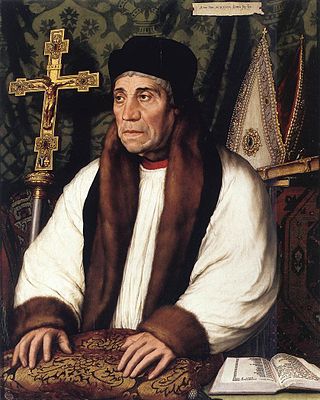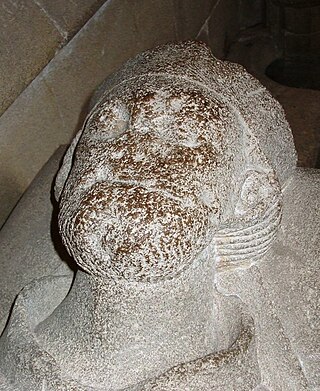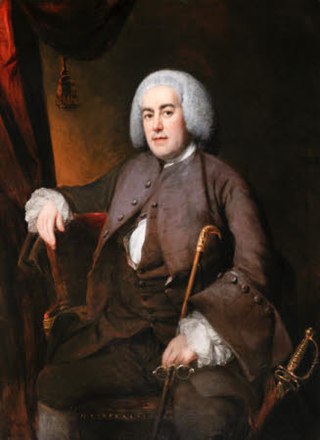Life
According to the Book of Llandaff , Herewald was elected in 1056 bishop of Llandaff by Gruffydd ap Llywelyn, Meurig ab Hywel and others, and was consecrated by Joseph, the bishop of St David's. The consent of the English authorities was obtained in 1059, when at the Whitsuntide gemot, held at Westminster, Archbishop Kinsi of York (in the absence of Stigandl) confirmed Herewald's appointment in the presence of Edward the Confessor. Ralph de Diceto states, however, that Herewald was consecrated by Lanfranc at Canterbury in 1071. The Canterbury Rolls speak of William the Conqueror investing Herewald, and of Lanfranc consecrating him. [1] The Oxford Dictionary of National Biography suggests, in the context of a dispute of the 12th century between the diocese of Llandaff and the diocese of St David's, that none of these details of his consecration can be treated as certain. [2]
During Herewald's episcopate, Glamorgan was conquered by Robert Fitzhamon and the Normans. Towards the end of his life he seems to have been suspended by Archbishop Anselm. He died on 6 March 1104. [1]

William Warham was the Archbishop of Canterbury from 1503 to his death.

Thomas of Bayeux was Archbishop of York from 1070 until 1100. He was educated at Liège and became a royal chaplain to Duke William of Normandy, who later became King William I of England. After the Norman Conquest, the king nominated Thomas to succeed Ealdred as Archbishop of York. After Thomas' election, Lanfranc, Archbishop of Canterbury, demanded an oath from Thomas to obey him and any future Archbishops of Canterbury; this was part of Lanfranc's claim that Canterbury was the primary bishopric, and its holder the head of the English Church. Thomas countered that York had never made such an oath. As a result, Lanfranc refused to consecrate him. The King eventually persuaded Thomas to submit, but Thomas and Lanfranc continued to clash over ecclesiastical issues, including the primacy of Canterbury, which dioceses belonged to the province of York, and the question of how York's obedience to Canterbury would be expressed.

Gisa was Bishop of Wells from 1060 to 1088. A native of Lorraine, Gisa came to England as a chaplain to King Edward the Confessor. After his appointment to Wells, he travelled to Rome rather than be consecrated by Stigand, the Archbishop of Canterbury. As bishop, Gisa added buildings to his cathedral, introduced new saints to his diocese, and instituted the office of archdeacon in his diocese. After the Norman Conquest, Gisa took part in the consecration of Lanfranc, the new Archbishop of Canterbury, and attended Lanfranc's church councils. His tomb in Wells Cathedral was opened in the 20th century and a cross was discovered in his tomb.

Edward Harold Browne was a bishop of the Church of England.
Urban was the first bishop of South East Wales to call himself 'bishop of Llandaff'. He was of a Welsh clerical family and his baptismal name in the Welsh language is given in charter sources as Gwrgan. He Latinised it to the papal name 'Urban'.

Walkelin was the first Norman Bishop of Winchester. He began the construction of Winchester Cathedral in 1079 and had the Old Minster demolished. He reformed the cathedral's administration, although his plan to replace the monks with priests was blocked by the Archbishop of Canterbury, Lanfranc. Walkelin was important in beginning St Giles's Fair in Winchester and was greatly active in national politics. For example, he signed the Accord of Winchester, was involved in the Council of London in 1075, and sought to resolve a conflict between Anselm of Canterbury and William II. He was regent of England for a few months at the end of his life.

Herbert de Losinga was the first Bishop of Norwich. He founded Norwich Cathedral in 1096 when he was Bishop of Thetford.

John Lloyd, born at Pendine, Carmarthenshire, Wales, the son of Morgan Lloyd, was principal of Jesus College, Oxford, vice-chancellor of the University of Oxford and Bishop of St David's.
Geoffrey de Muschamp was a medieval Bishop of Coventry.
Dúnán was the first bishop of Dublin, appointed under Dublin's Hiberno-Norse kings. He is known also as Donatus or Donat. The diocese was put on a regular basis, in 1028, at the request of Sigtrygg Silkbeard. In his obit in the Annals of Ulster Dúnán is described as "chief bishop of the foreigners".
The Lady Margaret Professorship of Divinity is a senior professorship in Christ Church of the University of Oxford. The professorship was founded from the benefaction of Lady Margaret Beaufort (1443–1509), mother of Henry VII. Its holders were all priests until 2015, when Carol Harrison, a lay theologian, was appointed to the chair.
Henry Harvey LL.D. was an English lawyer, who became Master of Trinity Hall, Cambridge, and established the London premises of Doctors' Commons, leased from the college. He also became Vice-Chancellor of the University of Cambridge.
Events from the year 1745 in Wales.

Sir George Hay was a British judge and politician who sat in the House of Commons between 1754 and 1778. He committed suicide.

Richard Fenton was a Welsh lawyer, topographer and poet.
George Hall was an English academic who served as the 24th Provost of Trinity College Dublin from 1806 to 1811. He also served as Erasmus Smith's Professor of Mathematics from 1799 to 1800 and the Church of Ireland Bishop of Dromore for a few days before he died in 1811.

The Convocation of 1563 was a significant gathering of English and Welsh clerics that consolidated the Elizabethan religious settlement, and brought the Thirty-Nine Articles close to their final form. It was, more accurately, the Convocation of 1562/3 of the province of Canterbury, beginning in January 1562.
Archibald Hamilton was the fourth Anglican Archbishop of Cashel.
John Herne (c.1593–1649) was an English barrister, involved in high-profile trials of the 1630s and 1640s.
The Rt Revd William Kenneth Macrorie (1831–1905) was bishop of Maritzburg, while John Colenso was bishop of the Diocese of Natal.
![]() This article incorporates text from a publication now in the public domain : Stephen, Leslie; Lee, Sidney, eds. (1891). "Herewald". Dictionary of National Biography . Vol. 26. London: Smith, Elder & Co.
This article incorporates text from a publication now in the public domain : Stephen, Leslie; Lee, Sidney, eds. (1891). "Herewald". Dictionary of National Biography . Vol. 26. London: Smith, Elder & Co.








